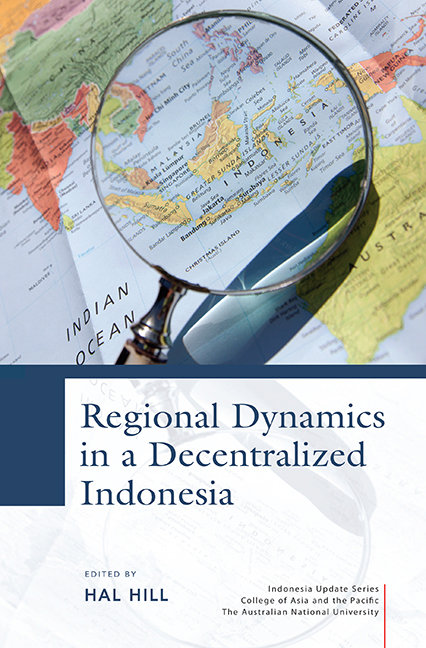Book contents
- Frontmatter
- Dedication
- Contents
- Tables
- Figures
- Contributors
- Acknowledgments
- Glossary
- Map of Indonesia
- 1 An introduction to the issues
- PART 1 HISTORICAL, ECONOMIC, POLITICAL AND SOCIAL PATTERNS
- PART 2 DECENTRALIZATION AND GOVERNANCE
- PART 3 LOCAL-LEVEL PERSPECTIVES
- 10 Dilemmas of participation: the National Community Empowerment Program
- 11 Governing fragile ecologies: a perspective on forest and land-based development in the regions
- 12 Explaining regional heterogeneity of poverty: evidence from a decentralized Indonesia
- PART 4 MIGRATION, CITIES AND CONNECTIVITY
- PART 5 CHALLENGES FOR INDONESIA'S PERIPHERY
- Author index
- Subject index
- INDONESIA UPDATE SERIES
11 - Governing fragile ecologies: a perspective on forest and land-based development in the regions
from PART 3 - LOCAL-LEVEL PERSPECTIVES
Published online by Cambridge University Press: 21 October 2015
- Frontmatter
- Dedication
- Contents
- Tables
- Figures
- Contributors
- Acknowledgments
- Glossary
- Map of Indonesia
- 1 An introduction to the issues
- PART 1 HISTORICAL, ECONOMIC, POLITICAL AND SOCIAL PATTERNS
- PART 2 DECENTRALIZATION AND GOVERNANCE
- PART 3 LOCAL-LEVEL PERSPECTIVES
- 10 Dilemmas of participation: the National Community Empowerment Program
- 11 Governing fragile ecologies: a perspective on forest and land-based development in the regions
- 12 Explaining regional heterogeneity of poverty: evidence from a decentralized Indonesia
- PART 4 MIGRATION, CITIES AND CONNECTIVITY
- PART 5 CHALLENGES FOR INDONESIA'S PERIPHERY
- Author index
- Subject index
- INDONESIA UPDATE SERIES
Summary
INTRODUCTION
It is now over a decade since Indonesia embarked on massive administrative and political decentralization, including in the land-based natural resource sector. The arguments for the decentralization of natural resources hinge on the assumptions that ‘locals know best’ and that reducing the distance between decision makers and ordinary citizens will result in policies that better address local needs and circumstances. The dynamics of decentralization in the natural resource sector, especially the forest sector, during the early post-reform years have been widely documented. Despite a lack of capacity, local governments scrambled to take the new opportunities to exploit the forests in their regions, resulting in distinct and undesirable patterns of governance – in particular, the indiscriminate allocation of timber licences, the benefits of which accrued disproportionately to local elites, and a failure to reinvest the proceeds in the forests. Inconsistencies in the legal framework led to incoherency in the workings of government institutions, and to a struggle between the different tiers of government for authority over natural resources. The critical elements of a national system of checks and balances, and downward and upward accountability of local governments, were missing or weak.
What has happened since those early years of decentralization? Has there been a change in direction over the past decade? What have been the effects of decentralization in the forest and land-based sectors? Can recent initiatives in these sectors improve the management of Indonesia's forest estate (kawasan hutan)? Focusing on the governance of forest lands, this chapter examines whether decentralization has fundamentally changed the ways in which the fragile ecologies of Indonesia's Outer Islands are managed.
We focus on forests and forest lands for at least three reasons. First, from a conservation perspective, Indonesia's forests house an invaluable wealth of biodiversity, much of it found nowhere else and some of it yet to be fully explored.
Second, the country's forest lands remain an important economic resource. It is true that, with the exception of the pulp and paper industry, the readily measurable economic returns from timber and wood products have declined, particularly when compared with the rising shares in national GDP of other natural resource-based sectors.
Information
- Type
- Chapter
- Information
- Regional Dynamics in a Decentralized Indonesia , pp. 260 - 284Publisher: ISEAS–Yusof Ishak InstitutePrint publication year: 2014
